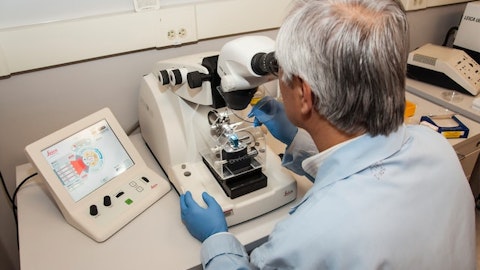Michael Sofia: Yes, Roy. On the deltas question, yes, look, we’ve looked at a lot of targets. And delta was clearly one of them. The idea initially was that potentially one could use AB-729 as an siRNA to knock down antigen load or that it’s required for delta to exist. Recent clinical data certainly has the generated data that’s not supportive of that. There seems to be some liver safety issues associated with potentially the accumulation of delta-related antigens in the cell and, therefore, some significant ALT elevation. So our assessment is that a siRNA developed for hepatitis B is probably not an option for delta. So also, as Bill has mentioned, the focus, our efforts with our reduced headcount on hepatitis B, we still think that’s a significant challenge that needs to be overcome. And we believe in our strategies. So that’s where we’re focusing our efforts.
Roy Buchanan: Got it. Thank you.
Michael Sofia: Thank you, Roy.
Operator: Thank you. And one moment for our next question. Our next question comes from Dennis Ding of Jefferies. Your line is now open.
Unidentified Analyst: Hi, good morning. This is Anthea [Ph] on for Dennis. Two questions from us. What are your thoughts on GSK in licensing the J&J siRNA? And what does that mean for the hep B space? Was Arbutus also in discussions with GSK? And then second, could you comment on the LNP litigation and what we should expect heading into the joint construction brief in December? Thank you.
Bill Collier: Yes, so let me take the second part first. And then maybe Mike Mack can talk about our business development efforts. So on the litigation front, as I think we put in the press release, there’s no new news to announce. We continue to remain passionate about defending our patents. In the Moderna case, there is a claims construction meeting scheduled for February 7th. Right. So that’s the next kind of data point in the Moderna trial. In the Pfizer case, there is not yet a date set for claims construction. I think that’s about all we can say at this stage. So Mike, do you want to take the GSK news?
Michael Sofia: Business development questions? So I think the way we look at the GSK news is that any consolidation in the field, any licenses that happen in the hepatitis B space are good for the field generally. And of course, we want to see success in the hepatitis B space with people getting to functional cure. That’s opportunity for everybody. So as you know, it’s a very, very large market and can certainly support multiple competitors. With regards to conversations with any particular company, we can’t comment on that, obviously. But I think it’s fair to say that we stay closely in touch with everyone in the field. And we continue those conversations whenever appropriate.
Unidentified Analyst: Great. Thank you so much.
Operator: Thank you. And one moment for our next question. Our next question comes from Brian Skorney of Baird. Your line is now open.
Unidentified Analyst: Hey, guys. This is Charlie [Ph] on for Brian. Thanks for taking our questions. So one is you mentioned that with the reduction in force, the cash runway is extended through 2026. And I was just hoping you could contextualize this for us with your kind of ideal clinical development timeline and possibly other scenarios just to kind of get a better grasp on what this cash runway means for you and your development efforts, as well as could you do, based on your research, just a little bit of comparing and contrasting, following up on the recent question about the GSK deal with the asset that they just in-licensed compared to inducer-owned banks?
Bill Collier: Yes. Okay. So, I mean, I think we’re pleased that we’ve now extended the runway into 2026. It allows us, a good, clear two years’ worth of funding. And as we continue to progress the Phase 2a studies, we’ll get further readouts, further data readouts, and then that will inform the next phase of either Phase 2b or Phase 3. It’s also going to allow us to continue to progress AB-101 through its Phase 1 activities. So all of that I think is quite encouraging. On the GSK question, a couple of comments. I think, one, it’s another recognition of the fact that combination therapy is the way to go in hepatitis B. As far as comparing imdusiran with the asset that they’ve licensed in, I think there are a couple of key differences.




